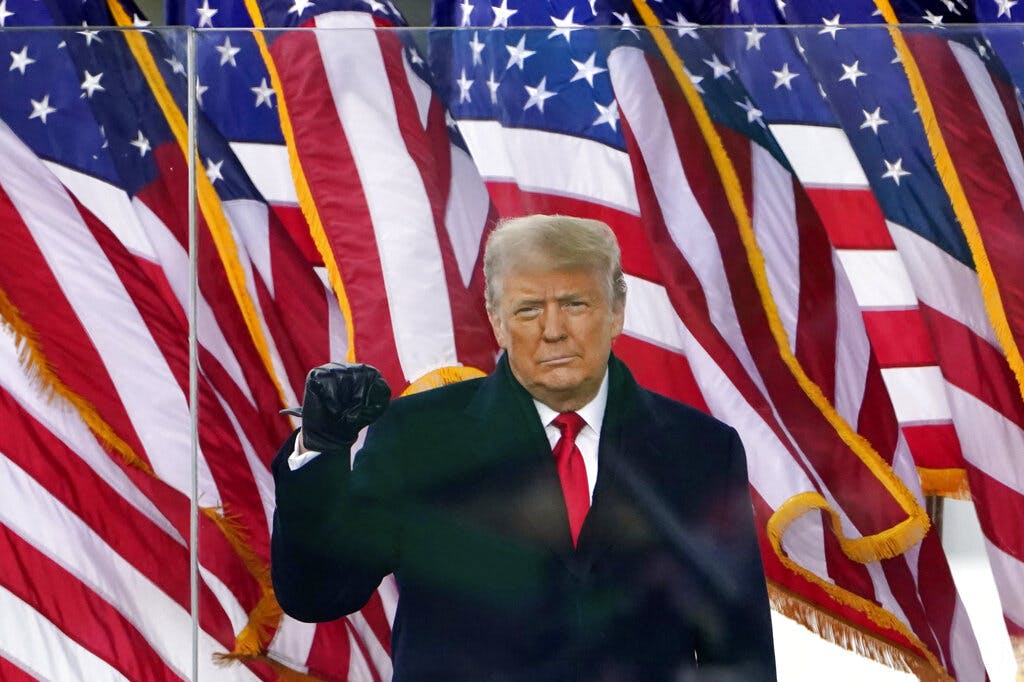Clash of Constitutional Sages Taking Shape Over Whether Trump Can Be Disqualified From the Presidency Under 14th Amendment
A new draft law review article — seen by the Sun — says the case for barring the 45th president from a second term is riddled with ‘theoretical defects and other errors.’

A clash among constitutional sages is in the offing with the circulation of a draft law review article — seen by the Sun — suggesting that the congealing consensus to disqualify President Trump on the basis of the 14th Amendment is riddled with “theoretical defects and other errors.”
“Sweeping and Forcing the President Into Section 3,” by Joshua Blackman and Seth Tillman, comes as a response to “The Sweep and Force of Section Three,” released last month by two other legal sages, Michael Baude and Michael Paulsen. That essay makes the full-throated case for banning President Trump from the ballot.
Messrs. Blackman and Tillman assert that the two other scholars have placed “a bullseye on one person, and one person alone: Donald Trump.” As a result, Messrs. Baude and Paulsen’s “laser focus precluded them from seeing a wider universe of contrary evidence.”
The quartet have now locked horns on whether the Civil War-era disqualification clause of the 14th Amendment, meant to bar those who have taken an oath of office and “engaged in insurrection or rebellion” from holding public office, means that the 45th president cannot serve again as president because of his actions on January 6. The earlier essay found that an insurrection occurred that day, though no federal court has arrived at the same conclusion.
Messrs. Baude and Paulsen argued last month that it does, finding that section three of the amendment “covers a broad range of conduct against the authority of the constitutional order” and “disqualifies former President Donald Trump, and potentially many others, because of their participation in the attempted overthrow of the 2020 presidential election.”
Now come Messrs. Blackman and Tillman, in a tightly argued treatise of more than 120 pages, to find that position “inaccurate” and to surface “originalist and textualist evidence pointing in different directions.” They urge “scholars, litigants, elections administrators, and judges” to allow Messrs. Baude and Paulsen’s claims to “percolate in the literature before placing too great a reliance on its novel claims.”
This second duo, both teachers of constitutional law, maintains that for Messrs. Baude and Paulsen to be correct, “a great many other people — living and dead — must be dead-wrong about a great deal, which until 2020 very few thought controversial. We think humility counsels otherwise.”
The new draft article takes the position that attempting to disqualify Mr. Trump “is not a slam dunk, and is likely to backfire” and that the rush to disqualification is an instance of viewing “today’s pressing question through a distinctly modern lens,” rather than one attuned to the Constitution’s original context and intent.
“Sweeping and Forcing the President into Section 3” accuses the authors of the earlier law review article of conjuring a “new Section Three chimera” and putting forth an argument marked by “deficiencies with legal theory” and marred by “significant errors” that are “endemic.” These include misreading case law that “lies in the heartland of judicial thinking and scholarship,” and results in “theoretical defects.”
Rather than opt for an “emphatic conclusion on contested and contestable ground,” Messrs. Blackman and Tillman pursue a more cautious approach, eschewing “charged language against long dead actors who, because they are dead, are in no position to defend themselves and their handiwork.”
Pushing back against Messrs. Baude and Paulsen’s position that “disqualification requires no further legislation or other action, by anybody, to be operative,” the new treatment of the question cautions that “whether any particular provision is or is not self-executing is not obvious, and frequently, the issue cannot be resolved based solely on the provision’s text.”
Moreover, “constitutional provisions are not automatically self-executing when used offensively,” meaning when they are deployed to obtain affirmative relief from a court. Messrs. Blackman and Tillman observe that Mr. Trump “has not been disqualified pursuant to any federal enforcement legislation.
“Indeed, the Special Counsel did not even indict Trump, or anyone else involved with January 6, with charges of insurrection or rebellion.” Mr. Trump was tried for incitement to insurrection during his second impeachment trial. He was discovered to be “not guilty,” in the words of the Senate that acquitted him.
“Sweeping and Forcing the President Into Section 3” also raises the possibility that Section Three might not apply to Mr. Trump at all, because the president might not be an “officer of the United States,” as required by the clause. The Constitution ordains that the president “shall Commission all the Officers of the United States,” suggesting that the president is not himself one of them.
Messrs. Blackman and Tillman observe that “President Trump was unique among all of his predecessors in that he did not hold any prior government position before he took the presidential oath of office on January 20, 2017,” thus raising the possibility that his unique background — in real estate and television — could insulate him from disqualification.
As the new draft puts it, Messrs. Baude and Paulsen “punched a textualist ticket good for one ride on the Trump train.” Now, Messrs. Blackman and Tillman are trying to prevent the disqualification express from leaving the station, even as they acknowledge that “this issue will be thrust into the courts, and in the end, quite possibly the Supreme Court.”
This dispatch has been expanded from the bulldog edition.

